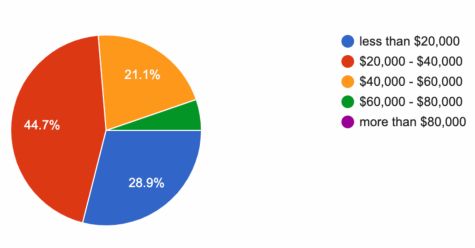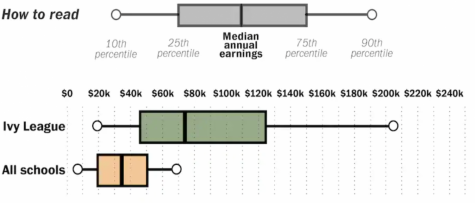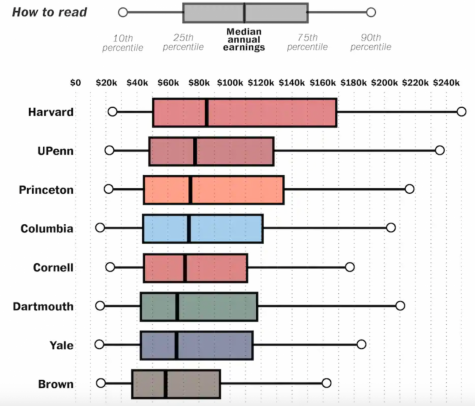How Much is the Ivy League Really Worth?
June 1, 2021
For the majority of high school students across the nation, college tuition is one of the major factors taken into account when applying to schools. With nearly 45 million borrowers in the United States, student loan debt has risen to about 1.7 trillion dollars in 2021. Here at Bergen County Academies, many students also face the same situation during the college application process and cannot help but wonder if college is really worth that much.
A cost benefit analysis on higher education was conducted by the Academy Chronicle, where the annual average attendance costs of Ivy League colleges was compared with other universities in New Jersey. The attendance cost included the living expenses (dorms, meal plans, etc.), books and supplies, and the tuition fees. For the Ivy League colleges, the average tuition was $57,752, the average living expenses for out-of-state students were $18,796, and the average cost of books and supplies was $1,158. The total average annual attendance cost was $77,706 for Ivy League colleges.
These fees were compared to the average annual attendance cost for three colleges in New Jersey: Rutgers University, Kean University, and Montclair State University. The average annual attendance cost for Rutgers was $20,623, for Montclair State the average was $19,949, and for Kean the average was $18,547 per year. The annual average attendance cost of those three colleges was $19,706. Comparing the two results there was a difference of $58,000 between the Ivy League colleges and in-state universities.
A survey was conducted among BCA students to get their opinions on these cost differences and to see if they thought an Ivy League college was really worth $58,000 more. 65% of students responded that the Ivy League is not worth it, 27.5% said they were unsure, and only 7.5% of students said that the Ivy League was worth it.
A sophomore in the Academy for Medical Science Technology wrote, “I think the competitive environment may be good for some people. The downside of going to a school like this [the Ivy League] is the cost as well as all the high-achieving students surrounding you. In this kind of school, it would be very difficult to stand out as an amazing student.”

When asked what was a reasonable attendance cost for college, 47% of students responded that $20,000 – $40,000 was reasonable, 28.9% of students said less than $20,000, 21.1% said $40,000 – $60,000, and only 5.3% of students said $60,000 – $80,000. Clearly, the majority of students thought that college tuition should not be over $60,000 per year.
One sophomore in the Academy for the Advancement of Science and Technology wrote, “College should be free. College being expensive is just another wall to prevent people from escaping poverty and keeping the wealth with the wealthy. Why can’t all colleges be really good, rather than having a separate group of ‘elite’ colleges? Not to mention how corrupt the Ivy League system is. It’s basically pay-to-get-in.”
The second part of the cost benefit analysis on higher education compared the average salary of Ivy League graduates with graduates from the same three universities in New Jersey. According to the U.S. Department of Education College Scorecard, the annual average salary of Ivy League graduates ranged from around $50k – $120k whereas the annual average salary of Rutgers, Montclair State, and Kean were $19k – $74k, $17k – $52k, and $21k – $82k respectively.

When BCA students were told these average salaries, a majority of 47.5% said that the Ivy League was not worth it, 30% said they were unsure, and 22.5% said that the Ivy League was worth it. Comparing these results to the responses from the previous question comparing annual average annual attendance costs, more students seemed to think that the Ivy League was worth it after seeing a direct comparison in terms of annual salaries.
One sophomore in the Academy for Medical Science Technology wrote, “I think the prestige surrounding Ivy League schools grabs the attention of employers. They see Yale or Princeton and all of a sudden that one candidate is so much better than the rest when in reality they could actually be average or even worse.”

BCA students definitely expressed a variety of different opinions regarding the pros and cons of higher education, specifically the ivy league. One sophomore in the Academy for Technology and Computer Science wrote, “I think it sort of depends by the individual– if being at an Ivy League university with other hardworking students can motivate someone to strive for more and be more successful, it may be worth it in some aspects.”
Although it may be impossible to give a definitive yes or no answer as to whether or not the Ivy League is really worth that much, the various responses showed that relying solely on numbers to assign a value for any university may be insufficient. As the Bergen County Technical Schools Vision Statement states, students are looking past the numbers and are preparing to “live, work, and lead in a global community.”
Sources:
College Scorecard, 2021, collegescorecard.ed.gov/.
Ingraham, Christopher. “This Chart Shows How Much More Ivy League Grads Make than You.” The Washington Post, WP Company, 26 Apr. 2019, www.washingtonpost.com/news/wonk/wp/2015/09/14/this-chart-shows-why-parents-push-their-kids-so-hard-to-get-into-ivy-league-schools/.
“Ivy League Tuition Comparison.” Univstats, 2021, www.univstats.com/comparison/ivy-league/cost-of-attendance/#:~:text=Each%20cost%20is%20in%20average,%2419%2C834%20when%20living%20off%20campus.





